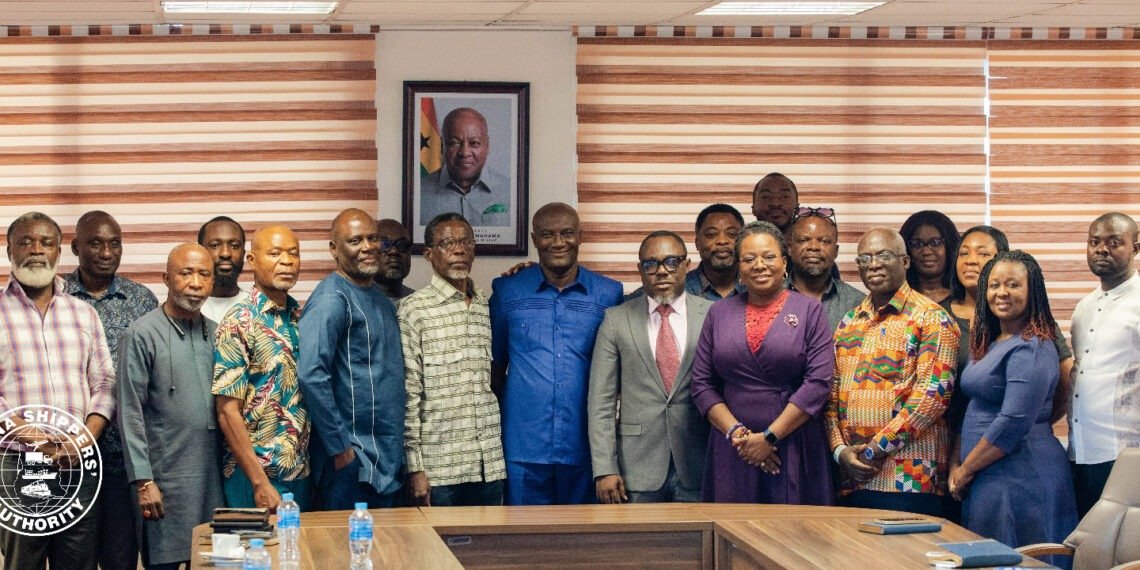The Ghana Ports and Harbours Authority (GPHA) and the Ghana Shippers’ Authority (GSA) have rearmed their commitment to collaborate in reducing the cost of doing business at Ghana’s ports.
This renewed partnership is aimed at boosting operational efficiency, cutting down unnecessary expenses, and making the nation’s ports more attractive to both local and transit customers. By addressing these key areas, the collaboration supports trade facilitation and aligns with the government’s economic reset agenda, which is focused on driving sustainable socio-economic growth.
A central focus of this partnership is the identification and elimination of operational bottlenecks that add to the cost of business. Professor Ransford Gyampo, the Chief Executive Officer of the GSA, recently paid a working visit to the GPHA. During his visit, he engaged with Brigadier General Paul Seidu Tanye-Kulono, the Director General of the GPHA, along with the management team. Their discussions revolved around exploring strategic approaches to streamline port operations, minimize delays, and ultimately lower the extra costs that often get passed on to consumers.
Prof. Gyampo emphasised that by identifying inefficiencies within the system, both institutions could implement sustainable solutions that would not only benefit importers but also enhance the overall efficiency of the maritime sector.
One of the primary challenges discussed during the meeting was the high cost of doing business at Ghana’s ports—a problem that stems largely from bureaucratic delays and operational inefficiencies. The collaborative approach between GPHA and GSA is designed to tackle these issues head-on.
By working closely together, the two authorities hope to create an integrated framework that addresses the root causes of delays and streamlines the clearance process. This, in turn, will lower the operational costs for importers and transit clients, making Ghana’s ports more competitive in the sub-region.
Review Of The Tax Structure
Taxation was another critical topic during the discussions. Brigadier General Tanye-Kulono took the opportunity to call for a review of the tax structure affecting transit and transshipment goods.
“On transshipment goods, for instance, I do not understand why goods that are spending just some minutes in Ghana’s ports and are on their way to other port should be taxed. The same applies to transit goods. My interactions with transit agents and clients have shown that they have a strong preference for Ghana’s ports but are inundated with taxes on transit goods, and this cannot be continued.”
Tanye-Kulono
This pointed critique highlights the unnecessary financial burden placed on goods that are merely transiting through the ports, a factor that could deter potential business and reduce the overall competitiveness of Ghana’s maritime operations.
In addition to calling for tax reforms, the the GPHA’s Director General further is advocating for the removal of Value Added Tax (VAT) and Covid-19 taxes on transit goods, as well as other taxes on transshipment goods. Removing these taxes is expected to facilitate a swifter clearance of goods, alleviate the financial burden on importers, and ultimately contribute to a more efficient trade process. Such measures are in line with President John Dramani Mahama’s broader intentions of reducing the cost of doing business in Ghana.
“I believe we must prioritise the national interest and the welfare of our stakeholders to ensure optimal service delivery. By working together, we can create a more competitive and business-friendly environment at our ports.”
Tanye-Kulono
This call for regular meetings and open communication between GPHA and GSA underscores their commitment to adapting quickly to challenges and ensuring that the ports operate at peak efficiency to support the government’s vision of a 24-hour economy.
The strategic partnership between GPHA and GSA comes at a critical time for Ghana’s economy. As the government pushes forward with initiatives aimed at economic reset and job creation, the efficient operation of the nation’s ports plays a crucial role in fostering national and regional trade. By addressing operational inefficiencies and overhauling taxation policies, this renewed commitment is set to transform Ghana’s ports into a more dynamic and competitive hub for commerce.
With these reforms, Ghana is well on its way to establishing itself as a leading maritime destination in West Africa, driving forward a robust and sustainable economic future.
READ ALSO: Analyst Expects Stronger Demand at the Shorter End of the Yield Curve as Bond Market Surges 67%



















